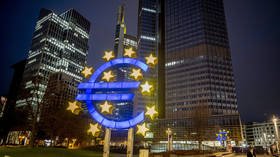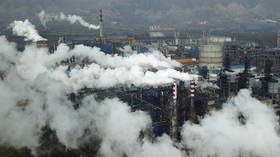EU inflation jumps to 13-year high in September, driven mainly by surge in energy prices and record-shattering cost of natural gas

Annual inflation in the euro zone in September accelerated to 3.4% from 3% a month earlier, hitting a 13-year high, data from the European statistics agency Eurostat shows.
This is the highest level for the index since the economic crisis in September 2008, when inflation stood at 3.6%. It also comes after German consumer prices rose by 4.1% in September to their highest level in nearly 30 years.
Also on rt.com Fitch downgrades global GDP forecast due to pandemic-related setbacksExperts say prices rose mainly due to the surge in energy costs, with the cost of natural gas shattering records this week at nearly $1,200 per 1,000 cubic meters. Yet the impact from production and shipping downtrends was also partly to blame, with durable goods prices showing a 2.3% increase from August.
On a monthly basis, consumer prices in the 19 countries of the euro zone increased by 0.5% in September. Core annual inflation excluding food and energy accelerated to 1.9% from 1.6% in the previous month.
Taking into consideration the existing hardships, analysts say inflation could hit 4% by the end of the year, which is twice the target for the euro zone set by the European Central Bank (ECB). The bank, however, does not expect the trend to continue through 2022, calling the situation temporary and predicting a quick decline early next year.
Also on rt.com S&P upgrades Russia’s economic growth outlook for 2021Market experts, however, warn that ECB and EU’s other central banks underestimate the risks posed by inflation.
“We think there are high chances that this inflation is less transitory than all central banks, including the ECB, are suggesting. Consumers may start demanding higher wages and corporations may accommodate them, on the basis they could pass on higher cost via higher final prices,” BNP Paribas economist Luigi Speranza told Reuters.
For more stories on economy & finance visit RT's business section














